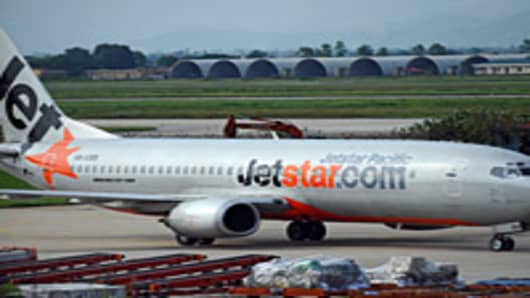Qantas’ planned joint venture with China Eastern Airlines could run into regulatory headwinds in Hong Kong, according to an expert on aviation policy who advised the former Hong Kong governor Chris Patten on the industry.
“In the rush to excite the markets and placate Qantas shareholders has anyone bothered to read the fine print? Those weasel words, ‘subject to regulatory approval’ were included in the press releases – and this may turn out to be far more than a formality,” Andrew Pyne, Senior Partner at Concuros Partners, an aviation consultancy firm said in an email.
When a country such as Australia negotiates an air services agreement with another country, only airlines owned and controlled by Australian nationals are allowed to exercise the Australian set of traffic rights that exist under it.
Since Hong Kong isn’t a country, Pyne pointed out, it allows only businesses that are incorporated and based in Hong Kong to use the territory’s traffic rights under what’s know as the Incorporation and Principal Place of Business (IPPB).
“There is no way in which an airline carrying an Australian branding and controlled in effect from Sydney and from Shanghai can be said to have its principal place of business in Hong Kong," Pyne said. "Many have tried to circumvent the IPPB rules; none have succeeded."
When contacted by CNBC, Qantas said it has had extensive discussions with regulators in the Chinese territory and will comply with regulations needed to get the new airline off the ground.
"We take nothing for granted in this process and realize that there are various tests the new entity will have to pass, but we are confident that it will," a Qantas Group spokesman said in a statement to CNBC. "We've been through complex and diverse regulatory processes in Vietnam, Singapore and Japan to establish airlines there."
Qantas acknowledged that traffic rights in Hong Kong are based on the principle of business test and said the new company will be based in Hong Kong and led by a local board and management team, who will make key decisions.
“All of our airlines in Asia are local airlines run by local people, starting with the CEO. Jetstar Hong Kong will be no different, with a Board and senior leadership team that has a high proportion of Hong Kong citizens,” the company said.
The teams running Jetstar's airlines in Japan and Singapore consist of more than 80 per cent of local people, the airline added. Jetstar Asia appointed Barathan Pasupathi, a Singapore citizen, as CEO this week.
Opposition from Unions
Besides contending with regulatory issues, Qantas is also facing opposition from its Australian employees, who are accusing the company of creating a low-cost base in Asia.
"We're concerned about pilots and staff" as they are being replaced with offshore services, Richard Woodward, vice president of Australian and International Pilots Association told CNBC after the deal with China Eastern was announced. Career opportunities are deteriorating very fast, he added.
On Monday, Alan Joyce, the CEO of Qantas Group told CNBC the union opposition was “unfortunate.”
“It's very critical and damaging that the Qantas brand and they don't realize it's a good thing for Qantas when they see it,” Joyce said in an interview in Hong Kong.
According to Jonathan Galaviz, chief economist at Galaviz & Co., a consultancy firm that specializes in tourism and particularly the casino industry, competition among from low-cost carriers will continue to force national airlines to adjust their traditional business models.
In fact, low-cost carriers will be the fastest-growing segment in Asia's aviation industry as the middle class expands, he said.
"You will see the legacy carriers taking a dual-pronged strategy," Galaviz said. "They'll try to maintain their competitive position in the business traveler segment by maintaining their legacy carrier and at the same time, tap that emerging middle class of Asia via their low-cost carrier strategy."



